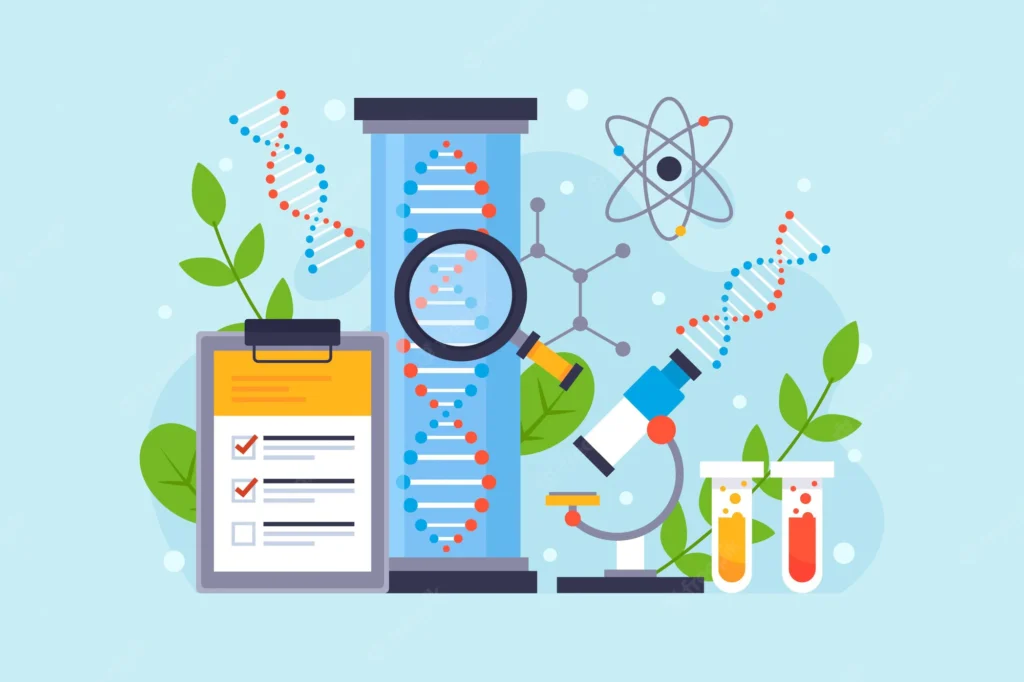
Essays About Biology: Top 5 Best Examples and 6 Prompts
Writing essays about biology can be difficult because it’s composed of many subtopics. Check out this article for our top essay examples and writing prompts.
Biology came from the Greek words “bios” (life) and “logos” (study). It’s why biology is the study of life or living organisms. Aside from being a natural science, it also has consolidated themes, such as cells making all organisms. Because it’s a broad topic, biology is divided into specialized fields such as botany, genetics, zoology, microbiology, medicine, and ecology.
Biologists consider living beings’ origin, evolution, growth, function, structure, and distribution. It’s a comprehensive subject, so there are many things you can write about in your essay. However, at the same time, you might find it challenging to focus on just one area.
Below are examples to give you an idea of how to write your essays about biology:
1. Essay About Biology by Kelli Wilkins
2. my interests in biology by anonymous on essaywriting.expert, 3. essay on the importance of study of biology by akhila mol, 4. what biology means to me by anonymous on studymode.com, 5. how my biology teacher changed my perspective of learning the subject by sankalan bhattacharya, 1. biology in my everyday life, 2. something i realized because of biology, 3. my memorable biology class experience, 4. genetics’ role in people’s diseases, 5. my experience during the pandemic, 6. biology and health.
“Studying Biology is important for a number of reasons, but in particular because it is used in every field. If we did not have a good understanding of Biology then nobody would be able to understand how bodies work, and how life on earth functions.”
Wilkins shares her desire to study anatomy, a branch of biology, and expounds on what makes biology an essential field. Because biology lets people know more about the world, she digs into why she’s interested in anatomy, specifically to find ways to cure illnesses and develop technologies to discover new treatments. She ends her essay by relating biology to the existence of doctors and hospitals.
“It is known that education plays an important role in the life of any individual. It gives an opportunity to develop personality and gain specific skills, to get profound knowledge and experience in order to apply them practically in the future. As for me, my major goal is to study Biology in order to get appropriate knowledge and skills required for my future profession.”
The author shares why they want to study biology, referring to the human body as the “perfect machine” and curious about how it performs each of its systems’ functions. The writer also mentions how biology is critical to their future profession. They aim to help people with their health problems and relay their desire to research the brain to find more data on it.
“The study of biology owes great significance in human life, because man for its day-to-day requirements is dependent on plants and animals either directly or indirectly.”
Mol lists seven reasons why humans need biology in their daily lives. Her list includes health, diseases, agriculture, horticulture, food, animal breeding, and entertainment. She expounds on each point and how they affect a man during his time on Earth. She explains each relationship in a simple manner that’s easy to understand for the readers.
“Without biology, we would have no idea about an organism’s makeup, or the most basic unit of life, a cell… Biology influences me in many ways. Biology influences me by teaching me why to take care of the environment, why I am to take care of my body, and by giving me a better overall view of all scientific areas of study.”
In this short essay, the writer lists down reasons why biology is essential. These reasons include taking care of the environment, one’s body, and others. The author also expounds on their reasons by presenting facts supporting biology’s importance to the world and human lives.
“He told that the syllabus may be a good way to prepare for an exam but our knowledge should not be limited to any syllabus and the questions that were asked in the examination were related to the topic only. He told that if we try to know things in detail and understand them properly then the interest in the subject will develop, otherwise, students will not treat the subject as a subject of their choice.
Bhattacharya shares his experience with a teacher with a unique teaching style. His Biology teacher from Class 7, before the era of the internet, don’t just carry one book to get all his lessons from. Instead, he has a notebook with the collated information from many books to teach his class.
Bhattacharya’s teacher taught them things that were not in the curriculum, even if following the curriculum would give him higher points in his evaluation. He only wanted his students to learn more and share with them why learning differs from just knowing.
Do you want to be sure you have an excellent essay? See our round-up of the best essay writing apps to help you check your output.
6 Prompts for Essays About Biology

You don’t have to be a biology student to write an essay about the subject. If you’re looking for easy prompts to write about, here are some to get you started:
If mitochondria are the powerhouse of the cell, who is the powerhouse of your classroom? Your home? Relate a biology topic to a similar structure in your life, then explain why you think they are the same.
For instance, you can compare your mother to mitochondria which generate the energy needed to power a cell. The cell being you. You can say that she gives you energy every day by being there and supporting you in whatever way she can. This prompt bodes for a creative and intriguing essay.
Relay a lesson you learned from biology and how it perfectly explained something you were once hesitant about. Such as being insecure about your big ears – only to know from a biology trivia that ears never stop growing. You can then share how this help lessen your insecurity because you now know large ears are normal.
Do you have a memory you won’t forget that happened during biology class? Narrate this story and explain why it’s something that left an impression on you. To give you an idea, you can talk about the first time you dissected an animal, where you first realized how complex organisms are and that they are made of many systems to function, no matter how small.
Gene action and heredity are evolving. If you have a genetic illness or know someone who has it, you can share your experience. Then explain what your genes have to do with the disease. Is it something you got from your parents? Did they inherit it from your grandparents? Finally, you can add what your parents’ and grandparents’ lives were like because of the disease.
Virology, another branch of biology, studies viruses and viral diseases. A recent example is the coronavirus pandemic, where more people realized the importance of knowing a virus’ origin, structure, and how they work. Write an essay where you explain how the pandemic operates, such as why people should wear masks, social distance, etc.
For this essay, you can write about how biology helps you care for your health. For example, you can include how biology helped doctors give you the appropriate diagnosis, how you had the opportunity to have the proper treatment, etc.
If you want to write on a related topic, here are essay topics about nature you can consider for your next essay.

Maria Caballero is a freelance writer who has been writing since high school. She believes that to be a writer doesn't only refer to excellent syntax and semantics but also knowing how to weave words together to communicate to any reader effectively.
View all posts
Free Biology Essay Examples & Writing Tips
Don’t know what to write about in your essay on biology? Looking for good biology essay examples for inspiration? This article has all you need!
A biology essay is a type of academic paper that focuses on a particular topic of biology. It can discuss animal life, cycles in biology, or a botanic subject. You will need to demonstrate your critical thinking skills and provide relevant evidence to support your perspective.
On this page, you will find examples of biology essays. You will also find here tips and topics prepared by our experts . They can assist you in nailing your short or extended essay.
Areas of Research for Biology Essays
If you’ve been assigned to write a biology essay, you probably know which area of research you have to choose. However, it might be beneficial to explore other available scopes. It’s useful for both interdisciplinary study and the cases when you are free to pick your area of research. In this section, let’s figure out what you can study in biology.
Here are biological areas of research you should be familiar with:
- Cancer Biology studies this type of disease to prevent, detect, diagnose and cure it. The ultimate goal of such biologists is to eliminate cancer.
- Cell Biology is a branch that studies the structure, function, and behavior of cells. Here, biologists study healthy and sick cells to produce vaccines, medication, etc.
- Biochemistry is an application of chemistry to the study of biological processes on cell and molecular levels. It is a cross-discipline between chemistry and biology. The focus is on the chemical processes of living organisms.
- Computation Biology is a study of biological data that develops algorithms and models to understand biological systems. Here, scientists either work for institutions or research for private enterprises.
- Genetics is an area that focuses on the study of genes and genetic variations for health benefits. It looks at the way DNA affects certain diseases.
- Human Disease is an area within which scientists study different diseases. The field covers cancer, developmental disorders, disease genes, etc.
- Immunology is a branch of biology that focuses on immunity. Immunologists look at the way the body responds to viruses as a way to protect the organism.
- Microbiology studies all living organisms that are too small for our eye to see. It includes bacteria, viruses, fungi, and other microorganisms.
- Neurobiology is the study of the nervous system. Biologists examine the way the brain works and look into brain illnesses.
- Stem Cell and Developmental Biology seeks to examine how the processes behind stem cell’s ability transform cells. The biologists in this area use the power of stem cells to model human illnesses.
Essay on Biology: Writing Tips
Want to know how to start a biology essay? Wondering about the best way to write your essay on biology? Then check out the following tips.
When you’re writing about biology, pay attention to the following features:
- Introduction . Just as in any other form of academic writing, the first section of your paper introduces the subject. Here, explain why your ideas are relevant to biology as a science.
- Thesis Statement. The final one or two sentences of the first paragraph should include your original hypothesis and experiment. You will be proving them in the main body. You do not have to include the results as the reader will encounter them later. If you’re struggling with this part, try our thesis generator .
- Main Body. In this part, write about all the experiments in detail. Often, teachers require to include visual aid to prove your point. For Zoology, Anatomy, Botany, it is pretty easy to find some photos and illustrations.
- Conclusion. Here, restate your thesis. Reemphasize the most critical aspects described in the main body. You can do it by using our summarizing tool . The goal of this last paragraph is to leave an everlasting impression on the reader.
Thank you for reading our article. We hope you found it helpful. Share it with your class peers who also study biology. Additionally, have a look at the biological essay examples below.
809 Best Essay Examples on Biology
Grass and its importance, the benefits of animals to humans essay.
- Words: 1166
The Effect of Temperature on Amylase Activity
- Words: 1293
Biology of Grasses: Description and Importance
Effects of vinegar on the germination rate of mung beans seeds.
- Words: 1750
Ubiquity of Microorganisms
- Words: 2210
Bronfenbrenner’s Bioecological System Theory
- Words: 1827
Anaerobic Respiration and Its Applications
- Words: 1274
Seed Germination Experiment: Results and Discussion
Mung seed germination patterns under varying ph values, botany and taxonomy of the onion.
- Words: 2414
Strawberries History
- Words: 1484
Dark or Light Skin: Advantages and Disadvantages
Mitosis and meiosis in onion root tip.
- Words: 1691
Pets and people
Nanobiotechnology, its advantages and disadvantages, similarities and differences of photosynthesis and cellular respiration, the c-fern plant laboratory experiment.
- Words: 1101
Osmosis Through a Potato Slice Dipped in Solutions of Varying Concentrations
- Words: 1075
Lemon, Its Origin and Production
- Words: 1115
Characteristics of Adult Development
- Words: 1311
Browning Reactions Explained
Rabbit muscular system dissection report, microbiology: zygomycota, ascomycota and basidiomycota, mitosis in onion root and whitefish blastula, vitamin a: description and usage, eukaryotic and prokaryotic cells: key differences, aspects, importance and issues of biodiversity, a study of the brine shrimps and their natural environment.
- Words: 1937
Seed Germination and Osmosis
- Words: 1127
Importance of the Brain in Human Body
The characteristics and importance of nervous system.
- Words: 1705
Cell Organelles, Their Functions, and Disease
- Words: 1195
Transpiration Process in Plants
Co-evolution: angiosperms and pollinating animals, botany and zoology in the classroom.
- Words: 1631
Substrate Concentration and Rate of Enzyme Reactions
- Words: 1730
Archaea and Bacteria Prokaryotes Dichotomous Keys
Cells, tissues, and major organs systems.
- Words: 2269
Different Ecosystems and Living Things
Marine life in united arab emirates.
- Words: 1474
The Integumentary and the Skeleton System
- Words: 1100
Description of Mitosis and Meiosis
Forensic procedures: hairs and fibres.
- Words: 2067
Molecular Biology. Production of pET28b and EGFP Clones
- Words: 4609
The Insect Effect on Human Life
Photosynthesis as a biological process, the digestive system in the human body, olfactics and its importance for living beings.
- Words: 1446
Cane Toad: Introduction and Threat
- Words: 1018
The Thermoregulation Is and Its Importance
The function and structures of the human heart, invertase enzyme: description and role.
- Words: 1151
A Brief Discussion of Animal and Plant Cells
The process of a prenatal child’s development, pollutants effects on cellular respiration rate.
- Words: 1434
Ethnobotanical Uses of Plants
- Words: 1938
Falling in Love as Part of Natural Selection
- Words: 1085
Microbial Growth and Effect of pH on It
- Words: 1330
Dugesia, a Planarian With Its Peculiar Characteristics
- Words: 3207
The Euphorbia Plant Modification and Adaptation
The effect of different shampoos on the bacteria growth.
- Words: 1737
Introduction to the Nervous System
A light microscope: function and usage, the anatomy and physiology of the nervous system of a rat.
- Words: 1612
Basic and Applied Biology: Key Differences
Is earthworm beneficial or harmful to humans, case study: human body water balance, membrane hands-on laboratory report.
- Words: 1176
Yeast and the Fermentation Process
Digestion, absorption and assembly of proteins.
- Words: 1456
The Kingdom Fungi: The Structure, Characteristics
How scoby changes its environment: lab experiment.
- Words: 1214
Cell Counting and Measurement Under Magnification
- Words: 1641
Lipids: Fatty Acids and Glycerols
The dna extraction procedure: scientific experiment, human circulatory system and evolution, common biochemical cycles, evolution of predator and prey pairings, ubiquity of bacteria: laboratory activity.
- Words: 1496
Consequences of Orange Juice on the Germination of Mung Bean Seeds
Biology: photosynthesis and respiration, psychophysics: definition & fundamentals.
- Words: 1606
Rosalind Franklin: The Discovery of the DNA Structure
Food macromolecules – lipids, carbohydrates, and proteins, the importance of sleeping and dreaming, researching the physiology of the eye.
- Words: 1122
Microbiology and Its Role in Healthcare
Climate change and threat to animals, microbiological studies, applications, and current discoveries, brine shrimp habitat, the genus rosa’s adaptation to the environment.
- Words: 1144
The Characteristics and Importance of Chickpeas
- Words: 3665
Life in the Bottom of the Ocean and Its Protection
- Words: 1529
Physiology of Uromastyx Aegyptia
- Words: 1340
Natural Sciences. The Phenol Red Broth Test Experiment
- Words: 1156
A Study of “Escherichia Coli”
History of biotechnology.
- Words: 1908
Vertical Stratification
Planting bamboo: the role of photosynthesis, “the egg and the sperm” by emily martin critique.
- Words: 2577
Microbial Biotechnology and Pharmaceutical Impact
Soil impact on the growth of plants.
- Words: 1227
Cell Culture and Biomedical Applications
- Words: 1485
How the Human Eye Works Analogous to a Camera
Corn plant’s developmental stages, sleep may be nature’s time management tool by carey, venus flytraps and arthropods: plant-animal interactions.
- Words: 2088
Gekkonidae: Biological Characteristics
- Words: 1121
Melanin Theory as a Pseudoscientific Claim
- Words: 1645
Domesticated, Cultivated, and Wild Species
Human reproductive biology: organs, structure, functions.
- Words: 2909
Biology. Cell Analogy – Nucleus + Nucleolus
Biology of the invertebrates: malaria, 16s and 18s ribonucleic acids: the key differences, photosynthesis, fermentation, and enzyme activity, escherichia coli-related articles review, stress & health: “why zebras don’t get ulcers” book by sapolsky, traps: artificially designed or modified cells, the “why zebras don’t get ulcers” book by sapolsky.
Tips on How to Write a Biology Essay: Learn from the Example of Jellyfish Essay
.png)
How to Write a Biology Essay
In this article, we will guide you on how to write a perfect biology essay from scratch. You’ll find various tips to help you excel in writing your essay and creating a paper worth the highest grades. We also prepared a jellyfish essay example for you, so it can be easier to enhance all the specifics and structure of this kind of paper.
What is Biology Essay
A biology essay is a student-written work where you present arguments and ideas about a particular biological topic. The essay on biology can take different forms like argumentative, cause-and-effect, descriptive, detailed analysis, or ‘how-to’ instruction, depending on the professor’s guidelines and writer’s preferences.
A descriptive paper can explain a biological subject, while an argumentative one provides evidence to support a point of view. It’s up to you to choose which type is more suitable for the topic you’re writing about. The most common type is a cause-and-effect essay explaining an event’s reasons and consequences.
How to Craft a Perfect Essay About Biology
Writing is an art form that requires time and effort. But if you prefer someone else to write the paper for you, you can just text the experts, ‘ do my homework for me ,’ and consider it done.
Here is the step by step instruction to organize the process for desired results.
.png)
Choose Your Biology Essay Topic
To get a good grade:
- make your paper informative and enjoyable by choosing a topic you wish to explore.
- Use a brainstorming technique to generate 30-50 options for biology essay topics and research to create a shortlist.
- Keep a notebook to jot down your ideas.
Choose a Question for Research
When writing a biology essay, use a scientific approach by selecting a research question related to your topic. Always avoid overly complex or apparent questions. You can also text our profs ‘ write my research paper ,’ and it can be done in a blink.
Create an Outline
Always have a clear plan when writing biology essays while starting a paper. Use a 5-paragraph structure with an outline to keep your main idea and arguments organized. Use any format that works best for you and adjust as needed. Discard any ideas that don’t fit your research question.
Use a Strong Thesis Statement
The introduction should end with a strong thesis statement synthesizing the overall essay, conveying the research question and your point of view. The paper is ineffective without a clear thesis, as readers may not understand your position.
Use Citation and References
Include a list of references in your academic papers, such as biology essays, to avoid plagiarism and provide data sources. Use the appropriate citation style, like APA or CSE, and consult a guide for requirements.

How to Structure a Biology Essay
Ensure your essay has an attention-grabbing introduction, a detailed body, and a solid conclusion with distinct sections. Use around seven paragraphs for the main body, adjusting as needed for the required word count.
Biology Essay Introduction
In the introduction of your essay about biology, showcase your expertise by providing a brief background of the topic and stating the essay’s objective. For a research paper, explain why the study is relevant. Make sure the reader understands the essence of your subject.
The body section of your essay on biology should focus on supporting and defending your thesis statement. To achieve this, make a list of essential points to cover and address each one step by step. Starting a new paragraph for each point ensures neatness and a continuous flow.
In conclusion, restate your thesis statement and summarize supporting points to solidify your arguments. Avoid introducing new concepts, and leave a lasting impression on your instructor.
Jellyfish Essay - Example of a Biology Essay About a Fascinating Creature of the Ocean
Jellyfish, also known as jellies, are incredible creatures of the ocean. They’re members of the phylum Cnidaria, including corals and sea anemones. You can find jellyfish in every ocean around the globe, from the surface to the depths of the sea.
Do you know what shape the jellyfish body has?! It’s one of their most unique features. Their bell-shaped body comprises a soft, jelly-like substance called mesoglea, found between two cellular layers. The outer layer of cells, the epidermis, is thin and flexible, while the inner layer, the gastrodermis, contains the jellyfish’s digestive system. At the bottom of the bell is the mouth, surrounded by tentacles armed with stinging cells called nematocysts.
The jellyfish tentacles consist of venom-filled sacs, which can be potentially dangerous and life-threatening. Considering the severity of its sting, researchers have gathered information on how to treat it effectively. Use thick clothing, tweezers, sticks, or gloves to alleviate the sting. It’s crucial to avoid touching the sting with bare skin since the venom can cause severe harm. Always dispose of the tool used for removing the sting to prevent re-stinging.
Jellyfish are creatures that feed on small fish and other tiny marine organisms. They capture their prey using the tentacles and bring it to their mouth. Once the food is inside the jellyfish, it’s broken down by digestive enzymes and absorbed into the gastrovascular cavity.
An exciting thing about jelly is its life cycle. They go through several stages of development, starting as a tiny, free-swimming larva and then growing into a polyp. The polyp stage is stationary, and the jellyfish attaches itself to a surface using a sticky pad. During this stage, the jellyfish reproduces asexually, creating clones of itself. These clones then break off from the polyp and develop into the familiar bell-shaped body of the adult jellyfish.
Jellyfish play an essential role in the ocean’s ecosystem too. They’re a food source for many marine creatures, including sea turtles and some fish species. They also help to control the population of tiny marine animals by feeding on them, and their waste products contribute to the nutrient cycle in the ocean.
However, jellyfish populations can sometimes explode and become a nuisance. This phenomenon mostly occurs when their natural predators are eliminated from the ecosystem or when water conditions, like temperature and salinity, are conducive for jellyfish growth. In cases where jellyfish populations reach excessive levels, they can clog fishing nets and interfere with other human activities in the ocean.
Jellyfish really are stunning creatures of the ocean. They’re diverse, with many different species, and are essential to the marine ecosystem. While they can sometimes become a nuisance, they’re vital to the ocean’s food web and nutrient cycle. Studying jellyfish can give us a greater understanding of the complex and interconnected systems that make up our oceans.
Practical Tips for Creating Perfect Academic Papers
Developing writing skills is crucial for your academic success regardless of your major. Check out these tips we provided for improving your writing. But if you aren't fond of writing, you can easily hand it to professionals by saying, ‘ do homework for me .’
Search for Samples or Examples
To improve your writing, analyze examples of well-written biology essays or research papers. Although not all online samples are perfect, they can still provide insights into what works and what doesn’t. However, avoid plagiarism and ensure your paper is original by presenting fresh ideas and a unique perspective.
Read Whenever You Can
Develop your writing skills by reading widely and extensively. Look for biology papers in scientific journals, websites, or books. Don’t forget to take notes on interesting points that you can use in your papers later.
Practice Makes Perfect
Don’t expect to write a perfect paper on your first try, so take every opportunity to practice your writing. Find a mentor if needed and use online resources to learn from your mistakes and improve your skills.
Always Organize Your Writing Process
Organize your work process instead of waiting for inspiration by defining stages, scheduling time for each task, and eliminating distractions. Don’t wait for mood to write an essay about biology; use different strategies to overcome writer’s block.
Proofread and Get Other Feedback
It’s hard to assess your own work accurately. Seek feedback from peers or instructors to identify strengths and weaknesses to improve upon. Don’t wait for your professor’s feedback to know if your biology essay is good.
Interesting Biology Essay Topics from Our Experts to Practice Your Writing
In this paragraph, we listed different biology essay topics from which you can choose your preferred one and practice writing to excel in your academic papers.
- A jellyfish - my favorite creature
- Facts about animal behavior
- Biodiversity conservation
- Chemical Ecology
- Impacts of air pollution
- Acid Rain’s impact on wildlife
- The greenhouse effect
- Causes of global warming
- Effects of climate change on nature
- Ways to avoid water pollution
These are interesting topics and also some of the most significant environmental problems. Choose the one you like and practice.
Final Thoughts
This article provides tips that will definitely make your writing process easier and more effective. Adjust these tips while writing your biology paper and structure it as we did in the jellyfish essay example. But if you still prefer a professional to do it for you, contact us by writing ‘ do my research paper ,’ and our experts will handle it.

- Plagiarism Report
- Unlimited Revisions
- 24/7 Support
How to Write a Biology Essay
A biology essay isn’t just a bunch of words on paper, but it’s a way to combine scientific discovery with solid writing. This makes it an essential skill to have for both students and scholars.
No wonder you are looking for how to write a biology essay like an expert. It means you will be glad to know that this blog post has all the expert tips and tricks you need to know for crafting a masterpiece. Let’s get started.
Table of Contents
Expert Tips on How to Start a Biology Essay Like a Pro
Crafting a good biology essay involves putting together a structured approach. You must thoroughly understand the topic and be able to organize your ideas clearly. Here’s a comprehensive guide with examples to help you write an outstanding biology essay.
Establish a Good Understanding of the Prompt
Understanding a biology essay prompt is important to ascertain the expected outcome.
If you have the option to choose a topic, go for a unique one so your essay is interesting to read .
For example:
Let’s say the topic of your essay is “The Impact of Climate Change on Coral Reefs.”

Get Your Custom Essay Written with 50% Discount Act Now!
Perform an In-Depth Research
Collect information from reliable sources like books, peer-reviewed journals, or trusted websites.
Look for facts, numbers, and examples related to the topic you pick.
As per the essay prompt, you can research coral bleaching due to the increasing ocean temperatures.
Create an Outline
An outline is a good way of structuring a biology essay. Also, it helps you organize your ideas logically. An example outline for our example topic could be:
Biology Essay Introduction
Coral Reefs Background
The Effects of a Climate Change
Mechanism of Coral Bleaching
Case Studies and Examples
Conservation and Mitigation Measures
Hook Your Readers with a Good Introduction
Whether a surprising fact or a thought-provoking question, the hook is key to grabbing the reader’s interest from the get-go! Plus, this biology essay introduction must also have background information about coral reefs and their significance in the ecosystem.
For Example :
What if no coral reefs were filled with stunning colors and biodiversity? It’s hard to imagine, right? But unfortunately, this could become a reality if we don’t take steps to protect them.
Develop the Body of the Essay:
The body of your biology essay must have several paragraphs. Each of these will focus on a specific subtopic.
Begin each paragraph with a topic sentence.
Look to add scientific concepts and terms to improve its readability.
For Example:
Discuss how increased sea surface temperatures lead to stress on coral polyps and subsequent bleaching.
Use Clear Examples
It is better if you support your arguments with real-world examples.
For the above topic, you can explain some coral reef regions affected by the climate in Australia.
Look into studies and reports that show how coral bleaching affects ocean wildlife.
Explain Complex Concepts
Make sure to explain any complicated biological ideas you bring up. If you need to use words like “symbiosis” or “photosynthesis” for your essay, make sure to define them so readers can understand what you’re talking about.
Discuss Mitigation and Conservation
Come up with ideas and plans to tackle the problem. Consider marine reserves, responsible fishing methods, and global deals to battle climate change.
Show examples of how coral reef restoration projects have been successful.
Craft a Thoughtful Conclusion
Recap what you’ve talked about in the essay.
Explain why the topic is important and how it relates to biology and environmental science.
End with a thought-provoking statement or call to action.
Protecting the coral reefs is not only about caring for all the sea creatures. It’s also a sign of our pledge to keep our planet’s fragile environments safe.
Proofread and Revise
Edit for grammar, punctuation, and spelling errors.
Ensure your essay moves along nicely and has a sensible order of thoughts.
Your biology essay must depict that you have a good understanding of major biology concepts. Remember that your personal viewpoint, knowledge, and evaluation will make your piece unique. Hopefully, this exciting yet to-the-point article answered your query on how to write a biology essay well.
First Time Order? Get Custom FREE ESSAY
No Plagiarism & No AI Content
Timely Deliveries
Premium Quality
Unlimited Revisions

- Assignment Writing Service
- Biography Writing Services
- Opinion Essay Writing Service
- Cover Letter Writing Service
- Critical Analysis Essay
- Romeo and Juliet
- Admission Essay
- Analytical Essay Writing Service
- Personal Statement
- Research Paper Writing Service
- Dream Essay
- Annotated Bibliography
- Dissertation Writing Services
- Contrast Essay
- Argumentative Essay
- College Essay Writing Service
- Application Letter
- College Paper
- Thesis Statement

We are a team of professional writers providing quality-assured essays, research papers, and assignments. We bring the most affordable services for you with multiple revisions. Get plagiarism-free content with Turnitin pass and on-time delivery. We Create Great Content, Value, & Reliability!
- Opinion Essay Writing
- Cover letter writing service
- College Essay Writing
- Our Writers

160 Biology Essay Topics
For most science courses, assignments are generally lab-based and rarely require much writing. However, all of that changes in biology courses when detailed essays must be written to highlight a student’s understanding of the subject. These essays are highly technical, with specific comments required to meet the factual nature of the subject.
In addition to meeting the factual requirements needed to complete the assignment, biology essays must also be written in a writing style that is informative and authoritative rather than subjective and personal.
These detailed specifics of writing a biology essay can make completing the writing difficult from the very beginning. Fortunately, we’ve created this guide to help students learn how to write a biology essay. In addition, we’ve also included 160 biology essay topics to help inspire the creative writing process.
How to Write a Biology Essay?
Writing a biology essay starts with choosing a topic. If your teacher has not already assigned a specific topic, then students must choose one that is broad enough to find credible resources and specific enough that the research won’t overtake the writing process.
To select a suitable topic for a biology essay, consider the type of biology class you are taking, the current and previous chapters studied, and the overall context of the course. These factors will help you select a topic that is likely to be relevant to your teacher’s needs and to the passing of your course.
Once students have selected a suitable topic, it’s time to research credible resources that will support the subject. To do this successfully, students need to consider the following:
- What information is already known about this topic?
- What topics are related or similar to this topic?
- Who are credible authors that can explain this topic?
- What additional sources will provide me with the information needed to complete this assignment successfully?
For example, if you want to write a biology essay on protein synthesis and its regulation at the transcriptional level, research material would include books, articles, and other written works published by credible authors or publishers. While important, this material isn’t the only type of research that should be completed.
Students may also consider consulting medical and biology dictionaries, textbooks, online research databases such as PubMed or Medline, and professional organizations for biologists to find additional sources. Once the research has been completed, it’s time to create the first draft of the biology essay.
Biology Essay Introduction
Starting an essay is always the same. Students should open with a catchy hook statement that introduces an interesting fact, presents a unique perspective, or raises a thought-provoking question.
Once that sentence has been created, students can use the middle part of the introduction to introduce fundamental concepts and provide background details about the topic.
Once that information has been laid out, and the reader knows the necessary details to make the reading interesting and worthwhile, students should move into the final portion of the introduction that answers the question: WHY is this essay important? This question is answered in the form of a thesis statement that details the essay’s overall purpose.
Biology Essay Body Paragraphs
The body paragraphs of your essay will contain the bulk of your research. Be sure that each body paragraph meets the following requirements:
- One clear idea represented per paragraph or section
- Examples that back up the point of the paragraph
- A clear and logical flow between paragraphs with transition words
Make sure that the body paragraphs only contain information pertinent to the subject or topic. Avoid fluff or filler words and phrases that don’t add any substance or value to the writing.
The number of paragraphs in the body may vary depending on the assignment parameters and the essay style. For example, an essay with a 1000 word limit won’t have as many body paragraphs as an essay with a high word count.
Additionally, a compare and contrast essay that examines the similarities and differences between two or more biology concepts may have more body paragraphs than an argumentative essay.
Biology Essay Conclusion
The final section of a biology essay is the conclusion. In this section, students need to summarize the major points of the essay and the overall purpose for writing it. The thesis should also be re-stated to recap what has been learned from the writing.
In addition to these sentences, students should include a final remark about their research and findings. This might be a thought that ties into the intro or another interesting angle that presents a new way of looking at your topic.
Once the conclusion is completed, students should edit and review their work. Make sure that the essay is free of grammar and spelling mistakes before submitting it for grading.
When it comes to choosing a biology essay topic, it is not always as easy as it seems. For students looking for help with writing a biology essay, we have compiled a list of 160 biology essay topics that will hopefully give you some great ideas.
Biology Essay Topics About Animals
- What is the importance of bats in our ecosystem?
- What is the difference between a domesticated cat and a wildcat?
- How do animals adapt to their environments?
- What are the various types of symbiotic relationships found in nature?
- Which animals have been known to show altruism towards other species?
- What impact does human activity have on animal behavior?
- What are some of the advantages and disadvantages of zoos?
- How do animal brains work?
- What is an animal’s anatomical structure like?
- What are some symbiotic relationships between humans and animals?
- What is the difference between herbivores, carnivores, omnivores, and insectivores?
- Why are having pets important to humans?
- What are the positive and negative impacts of commercial farming on animals?
- Do you think it is acceptable to keep pets in zoos? Why or why not?
- What are some common misconceptions about cats, dogs, rodents, cows, sheep, horses, reptiles/fish/insects?
- How do animal bones support their body structure?
- What are the effects of humans on the natural habitats of animals?
- What are some ways in which animal anatomy is similar to human biology?
- What are some symbiotic relationships found in the animal kingdom?
- Can humans and animals communicate with each other?
- How do different types of animal cells function differently than human cells?
- Why do some animals see better in the dark?
- Explain the circulatory system of cold-blooded animals and how it differs from that of warm-blooded animals.
- What are some examples of mimicry in nature?
Biology Essay Topics About Cellular Biology
- How does cell theory apply to cellular biology?
- What is mitosis, and where does it take place?
- What are the different parts of a cell?
- What is a nucleolus?
- What are the differences between prokaryotic and eukaryotic cells?
- How do viruses affect our cells?
- How does photosynthesis work?
- Why is it important to study cellular biology as a foundation for other disciplines of biology?
- What are the functions of organelles in cells?
- What is anabolism and catabolism?
- How do plants use photosynthesis to produce sugar while animals break down food for energy?
- Describe the process of homeostasis and explain how the human body maintains its internal environment.
- What are the important parts of a cell?
- How do cells reproduce?
- What is the difference between mitosis and meiosis?
- What is the importance of cellular research to humans?
- Explain mitochondria, chloroplasts, and vacuoles in plant cells.
- What are some of the problems with using stem cells in medical research?
- What are the differences between eukaryotic and prokaryotic organisms?
- How do humans reproduce sexually?
- Why is it different to clone plants than animals?
- What are some important functions of membranes in cells?
- What is the significance of mass spectrometry to molecular biology and genetics?
- How do viruses reproduce?
- What are mitochondria responsible for in eukaryotic cells?
- What is the difference between a plasmid and a virus?
- Do you think cloning animals should be allowed? Why or why not?
- What is a cell cycle?
- How do diseases affect the structure and function of cells?
- What are some ethical issues with genetic engineering?
- What is cell division, and how does it work?
- Where does meiosis occur in the body, and what does it accomplish?
- Explain the structure and function of ribosomes in eukaryotic cells.
- What is a cell membrane made up of, and what are its important structural components?
- How do antibiotics affect bacterial cells?
- Do you think cloning humans should be allowed? Why or why not?
- What makes up the cytoskeleton?
- How are molecular structures related to the functions of cells?
- What are some examples of biomolecules necessary for cell function and survival?
- What types of molecules make up an organism’s genome?
Biology Essay Topics About the Ecosystem
- What does the term food web mean?
- Why is it important to study population dynamics in an ecosystem?
- How do humans affect other species and their environments?
- How can we prevent and control invasive species, and why are they so dangerous?
- What effects does pollution have on animals and their habitats?
- How do global warming and climate change affect the ecosystem?
- What are the different types of animals found in ecosystems?
- What happens to an ecosystem when one species becomes extinct?
- What is the difference between biotic and abiotic components of an ecosystem?
- How do humans feed off other species to survive?
- Describe how the r-selected life strategy works.
- What are some examples of symbiosis found in nature?
- How does biodiversity affect the structure, function, and survival of ecosystems?
- How does the stability of an ecosystem depend on biodiversity?
- What are trophic levels, and how do they function to maintain the structure of ecosystems?
- Why are invasive species dangerous?
- How do global climate changes and human activities affect the biodiversity of ecosystems?
- What types of organisms thrive in wetlands?
- How do humans benefit from studying ecosystems?
- What ecosystems are best suited to rapid climate change?

Biology Essay Topics About Evolution
- Is evolution strictly a scientific theory, or is it also valid spiritually?
- Why is research about the evolution of life important to our understanding of the past?
- What are some examples of convergent evolution?
- How does natural selection contribute to evolution?
- Why is it important for people to understand evolution and its role in biology?
- What are some benefits that humans enjoy thanks to evolution?
- How do mass extinctions impact the evolution of different species?
- How does a mutation affect a population’s gene pool and diversity?
- Explain the core principles of Darwin’s theory of evolution.
- How does an organism’s ability to respond to environmental changes contribute to its rate of evolution?
- What is polyphyletic evolution?
- What are some examples of vestigial traits in humans and other species?
- How do eco-evolutionary dynamics play a role in evolution?
- Do you think that past mass extinction events had an impact on evolution? Why or why not?
- What are some benefits humans enjoy thanks to evolution by natural selection?
- How could modern-day diets affect the evolutionary growth of humans?
- What animals have had evolutionary changes based on threats to their diets?
- What evolutionary response makes for the best camouflage?
- What types of traits can be used to differentiate between closely related species?
- What are the main factors that prevent a population from evolving?
- How is artificial selection different from natural selection?
- Why do scientists still debate about evolutionary theory despite overwhelming evidence supporting it?
- What are some examples of convergent evolution in nature, and how do they function as an adaptation?
- Why is research about the evolution of life important to understanding the past?
Biology Essay Topics About Genetics
- What is genetic drift, and how can it lead to changes in a population over time?
- How do the different parts of DNA interact with each other?
- How are dominant and recessive traits identified?
- What are some examples of genetic disorders?
- What causes Down syndrome, and how is it diagnosed in children?
- How does natural selection act on mutations to create variation in a population?
- Can scientists use DNA testing to learn about our ancestors’ migratory patterns and where they lived?
- How can animal migration help us to better understand genetics?
- Define molecular genetics and explain how it relates to classical and Mendelian genetics.
- What is the Hardy-Weinberg equilibrium, and why is it important in population genetics?
- Do you believe that scientists should clone human beings? Why or why not?
- Why are dominant traits sometimes called masking genes?
- Why is genetic diversity important for long-term species survival?
- How are epigenetic changes related to evolution?
- What is the difference between gene expression and gene activity with regards to genetics?
- How do developmental genes affect the appearance of an organism throughout its life cycle?
- How have animal and plant breeders used genetic engineering to produce certain types of hybrids?
- What are the ethical implications of human cloning?
- What are the latest technologies in genetic engineering?
- What new technologies are needed to make human cloning a reality?
- How are living organisms adapting to the presence of plastics in our environment?
- Why are some individuals resistant to certain genetically programmed diseases?
- What are three common misconceptions about genetic engineering?
- What is transgenic technology, and how can it be used for disease prevention or treatment?
- How do microorganisms impact human health and the environment?
- What are some examples of a genetically modified organism?
- How does natural selection impact microorganisms?
- What is DNA profiling, and how can it help to solve crimes or return missing persons to their families?
- Why do scientists need more research surrounding epigenetics before drawing conclusions on its effects on evolution?
Biology Essay Topics About the Human Body
- What is the purpose of skeletal and respiratory systems?
- How do hormones affect our body on a daily basis?
- How does the endocrine system work as part of an overall regulatory system in the human body?
- What are some different types of cells found in the human body?
- What are the differences between exocrine and endocrine glands?
- What are stem cells, and why are they important to biological research?
- How do muscles work together to create movement in our bodies?
- How do bones help us to maintain balance while walking, standing up straight, and running?
- What are some ways that human behavior can impact our bodies?
- How do foods with high sugar content affect the digestive system?
- What organs are no longer necessary in the human body, and why?
- What blood types offer better protection from the elements?
- What are mosquitoes attracted to some humans and not to others?
- What pheromones do humans give off?
- What are the different types of blood cells?
- How does healthy eating help to maintain digestive health?
- Why do some people get migraines that others don’t seem to be bothered by?
- What is the pH level of human blood, and how can it be carefully regulated?
- How does altitude affect respiration in humans?
- What is the most complicated system in the human body?
- Explain the biological purposes of “Fight or Flight.”
- What role does the immune system play in human health?
- What is the difference between human anatomy and physiology?
Choosing any of these 160 biology essay topics will help students craft an informative and authoritative essay that is sure to earn them a passing grade.
Related Posts
- 100 Mental Health Essay Topics
- 65 Explanatory Essay Topics
- 200 Persuasive Essay Topics
- How to Choose Research Paper Topic
- 90 Concept Essay Topics
Categories:
- Essay Samples
- Essay Topics
- Essay Writing Guides
Recent posts:
- 170 Ethics Essay Topics
- 160 Satire Essay Topics
- 160 Rhetorical Essay Topics
- 155 Criminal Justice Essay Topics
- 150 Political Essay Topics
- 145 Classification Essay Topics
- 140 Sociology Essay Topics
- 140 Opinion Essay Topics
- 140 Environmental Essay Topics
- 135 Controversial Essay Topics
- 125 Classification and Division Essay Topics
- 120 Literary Essay Topics
- 100 Profile Essay Topics
- 90 Heart of Darkness Essay Topics
- 80 Holocaust Essay Topics
Testimonials


- Customer Reviews
- Extended Essays
- IB Internal Assessment
- Theory of Knowledge
- Literature Review
- Dissertations
- Essay Writing
- Research Writing
- Assignment Help
- Capstone Projects
- College Application
- Online Class
Biology Extended Essay: The Complete Guide for IB Students
by Antony W
March 13, 2023

Biology Extended Essay is an assignment that requires you to explore biological issue relevant to you and your environment.
Your focus should be on a particular biological emphasis within a broader context of scientific investigation. Given that the focus is on a biological system, you’ll have to make an analytical argument as you write the essay.
In this guide, you’ll learn exactly what you need to know about the IB Biology Extended Essay . Our goal with this lesson is to give you the most important information about the subject so that you can get the assignment done right.
What is Biology in an IB Extended Essay?
Biology in IB Extended Essay is the examination of living organisms and their life processes. The assignment integrates biological theories and examines the nature of the subject.
While you can approach a Biology EE from varying viewpoints, the treatment of the material used in your investigation must be 100% biological.
IB Biology Extended Essay Topics
The topic you choose to explore in your IB Biology Extended Essay shouldn’t be too broad or too narrow. Make sure you choose a focused topic that’s easy to investigate and easy to explain.
Your teacher expects you to explain how you arrived at your research question, and the best way to do that is to outline the aspects you wish to consider in the essay.
You may also have to formulate one or more hypothesis based on the research question.
The EE guide on the subject recommends that you choose your topics carefully, making sure you refrain from inappropriate topics such as those that are likely to inflict pain, involve the use of dangerous substances, or linked to safety concern.
You should avoid topics whose outcome are either obvious or already well known and documented in textbooks.
Doing Research for Your IB Biology Extended Essay
You will need to do primary and secondary research for your Biology Extended Essay.
1. Primary Research
For primary research, you can collect data from fieldwork, surveys, biological drawings, and biological observations.
If you’ve picked topic that requires practical work, you may have to conduct multiple, extensive fieldwork or do lab tests. In such a case, you will have to provide a detailed explanation of the experimental research procedures sued.
2. Secondary Research
When it comes to secondary research, you get data or information from literature.
Some students restate the information they collect from secondary sources, but doing so often adds little or no value to a Biology Extended Essay.
Therefore, the right approach is to analyze the data or information in an original way to add a new dimension and value to your research and to the essay at large.
Whether you do primary research, secondary research, or a combination of both, you need to make sure you have access to enough data or information to answer your research question.
How Do You Write an IB Biology Extended Essay?
The first step to writing a comprehensive, 4,000-word essay in Biology EE is to use the right scientific techniques to analyze the data you collect during research.
You then have to present your argument or evaluation based on the analysis you’ve completed.
You can include graphs, tables, and diagrams, and make sure you point out their significance in the essay so they’re easy to understand.
As with any other EE, your Biology essay should have a good structure and demonstrate a logical progression. Feel free to use headings and subheadings in the essay because it imposes a concise structure.
Your evaluation of the research questions should demonstrate that you not only understand the results from your experiments but also can explain their significance in a wider academic context.
Since you aren’t sure about what to expect from biological experiments, you may have to account for anomalies or unexpected results in your investigation.
In such a case, you have to provide explanations for the expected outcome and give an alternative explanation for such findings.
The subject also allows you to propose slight or major changes to the hypothesis presented in the essay, in which case you will have to suggest relevant approaches to testing the new changes.
Evaluation of Your Biology EE
Writing your EE in Biology also requires that you undertake a critical evaluation of the work that you have already done.
The evaluation helps you to identify and explain the limitation of your research by a number of factors including the reliability and validity of statistics, the precision of experimenting equipment and the reliability of sources.
You also need to consider biological limitations of your research. Such limitations are likely to arise from the inability to generalize based on a single form of an organism or problems of control and repeatability when using living organisms in your research.
Biology Internal Assessment vs Biology Extended Essay
It’s important to keep in mind that a Biology Extended Essay is not an extension of the Internal Assessment in the same subject. There are a few differences that set the two assignments apart, and it’s important to know them before you start working on the essay.
Get Extended Essay Writing Help
Do you need help with your Extended Essay in Biology? Our team of IB experts is here to help you write the 4,000-word essay, even if it’s on a complex topic. You can click here to learn more.
About the author
Antony W is a professional writer and coach at Help for Assessment. He spends countless hours every day researching and writing great content filled with expert advice on how to write engaging essays, research papers, and assignments.

Review Essays for the Biological sciences
A review essay for the biological sciences serves to discuss and synthesize key findings on a particular subject. Review papers are helpful to the writer and their colleagues in gaining critical awareness in specialized fields that may or may not be their own.
This guide explains what a review essay is and identifies several approaches to writing a review essay. Although much of the information is geared directly to the biological sciences, it is generally applicable to review essays in all fields.
What is a Review Essay?
A review essay is a synthesis of primary sources (mainly research papers presented in academic journals) on a given topic. A biological review essay demonstrates that the writer has thorough understanding of the literature and can formulate a useful analysis. While no new research is presented by the writer, the field benefits from the review by recieving a new perspective. There are several approaches one may take when writing a biological review:
A State of the art review
A state of the art review considers mainly the most current research in a given area. The review may offer new perspectives on an issue or point out an area in need of further research.
A Historical review
A historical review is a survey of the development of a particular field of study. It may examine the early stages of the field, key findings to present, key theoretical models and their evolution, etc.
A Comparison of perspectives review
A comparison of perspectives review contrasts various ways of looking at a certain topic. If in fact there is a debate over some process or idea, a comparison of perspectives review may illustrate the research that supports both sides. A comparison of perspectives review may introduce a new perspective by way of comparing it to another.
A Synthesis of two fields review
Many times researchers in different fields may be working on similar problems. A synthesis of two fields review provides insights into a given topic based on a review of the literature from two or more disciplines.
A Theoretical model building review
A theoretical model building review examines the literature within a given area with the intention of developing new theoretical assumptions.
Key Considerations for Writing a Biological Review Essay
This guide will inform you of certain things not to miss when writing a review essay. It will also give you some information about using and documenting your sources.
Keep your focus narrow.
When writing a review essay it is important to keep the scope of the topic narrow enough so that you can discuss it thoroughly. For example a topic such as air quality in factories could be narrowed significantly to something like carbon dioxide levels in auto manufacturing plants .
A good way to narrow your focus is to start with a broad topic that is of some interest to you, then read some of the literature in the field. Look for a thread of the discussion that points to a more specific topic.
Analyze, synthesize, and interpret.
A review essay is not a pure summary of the information you read for your review. You are required to analyze, synthesize, and interpret the information you read in some meaningful way.
It is not enough to simply present the material you have found, you must go beyond that and explain its relevance and significance to the topic at hand.
Establish a clear thesis from the onset of your writing and examine which pieces of your reading help you in developing and supporting the ideas in your thesis.
Use only academic sources.
A review essay reviews the academic body of literature—articles and research presented in academic journals. Lay periodicals such as, Discover , Scientific America , or Popular Science , are not adequate sources for an academic review essay.
If you are having trouble finding the academic journals in your field, ask one of your professors or a reference librarian.
Document your sources.
The material that you discuss in a review essay is obviously not your own, therefore it is crucial to document your sources properly. Proper documentation is crucial for two reasons: 1. It prevents the writer from being accused of plagiarism and 2. It gives the reader the opportunity to locate the sources the writer has reviewed because they may find them valuable in their own academic pursuits. Proper documentation depends on which style guide you are following.
Quote sparingly and properly.
No one wants to read a paper that is simply a string of quotes; reserve direct quotations for when you want to create a big impact. Often times the way a quote is written will not fit with the language or the style of your paper so paraphrase the authors words carefully and verbage as necessary to create a well formed paragraph.
Choose an informative title.
The title you choose for your review essay should give some indication of what lies ahead for the reader. You might consider the process you took in narrowing your topic to help you with your title—think of the title as something specific rather than a vague representation of your paper's topic. For example the title Wastewater Treatment might be more informative if rewritten as The Removal of Cloroform Bacteria as Practiced by California's Municipal Water Treatment Facilities .
Consider your audience.
More than likely your audience will be your academic peers, therefore you can make a couple assumptions and choose a writing style that suits the audience. Though your audience may lack the detailed knowledge you have about your topic, they do have similar background knowledge to you. You can assume that you audience understands much of the technical language you have to use to write about your topic and you do not have to go into great detail about background information.
Elements of a Review Essay
This guide explains each section of a review essay and gives specific information about what should be included in each.
On the title page include the title, your name, and the date. Your instructor may have additional requirements (such as the course number, etc.) so be sure to follow the guidelines on the assignment sheet. Professional journals may also have more specific requirements for the title page.
An abstract is a brief summary of your review. The abstract should include only the main points of your review. Think of the abstract as a chance for the reader to preview your paper and decide if they want to read on for the details.
Introduction
The introduction of your review should accomplish three things:
- It may sound redundant to "introduce" your topic in the introduction, but often times writer's fail to do so. Let the reader in on background information specific to the topic, define terms that may be unfamiliar to them, explain the scope of the discussion, and your purpose for writing the review.
- Think of your review essay as a statement in the larger conversation of your academic community. Your review is your way of entering into that conversation and it is important to briefly address why your review is relevant to the discussion. You may feel the relevance is obvious because you are so familiar with the topic, but your readers have not yet established that familiarity.
- The thesis is the main idea that you want to get across to your reader. your thesis should be a clear statement of what you intend to prove or illustrate by your review. By revealing your thesis in the introduction the reader knows what to expect in the rest of the paper.
The discussion section is the body of your paper. The discussion section contains information that develops and supports your thesis. While there is no particular form that a discussion section must take there are several considerations that a writer must follow when building a discussion.
- A review essay is not simply a summary of literature you have reviewed. Be careful not to leave out your own analysis of the ideas presented in the literature. Synthesize the material from all the works—what are the connections you see, or the connections you are trying to illustrate, among your readings.
A review essay is not a pure summary of the information you read for your review. You are required to analyze, synthesize, and interpret the information you read in some meaningful way. It is not enough to simply present the material you have found, you must go beyond that and explain its relevance and significance to the topic at hand. Establish a clear thesis from the onset of your writing and examine which pieces of your reading help you in developing and supporting the ideas in your thesis.
- Keep your discussion focused on your topic and more importantly your thesis. Don't let tangents or extraneous material get in the way of a concise, coherent discussion. A well focused paper is crucial in getting your message across to your reader.
- Keeping your points organized makes it easier for the reader to follow along and make sense of your review. Start each paragraph with a topic sentence that relates back to your thesis. The headings used for this guide give you some idea of how to organize the overall paper, but as far as the discussion section goes use meaningful subheadings that relate to your content to organize your points.
- Your thesis should illustrate your objectives in writing the review and your discussion should serve to accomplish your objectives. Make sure your keep your discussion related to the thesis in order to meet your objectives. If you find that your discussion does not relate so much to your thesis, don't panic, you might want to revise your thesis instead of reworking the discussion.
Conclusions
Because the conclusions section often gets left for last it is often the weakest part of a student review essay. It is as crucial a part of the paper as any and should be treated as such.
A good conclusion should illustrate the key connections between your major points and your thesis as well as they key connections between your thesis and the broader discussion—what is the significance of your paper in a larger context? Make some conclusions —where have you arrived as a result of writing this paper?
Be careful not to present any new information in the conclusion section.
Here you report all the works you have cited in your paper. The format for a references page varies by discipline as does how you should cite your references within the paper.
Bastek, Neal. (1999). Review Essays for the Biological Sciences. Writing@CSU . Colorado State University. https://writing.colostate.edu/guides/guide.cfm?guideid=79
- EssayBasics.com
- Pay For Essay
- Write My Essay
- Homework Writing Help
- Essay Editing Service
- Thesis Writing Help
- Write My College Essay
- Do My Essay
- Term Paper Writing Service
- Coursework Writing Service
- Write My Research Paper
- Assignment Writing Help
- Essay Writing Help
- Call Now! (USA) Login Order now
- EssayBasics.com Call Now! (USA) Order now
- Writing Guides
How To Write A Biology Essay
Table of Contents
Content of this article
Topic choice.
- Content page
- Research question
- Introduction
- Investigation
Biology papers give us an opportunity of understanding forms that are complex in life. This, therefore, means you will have the chance to fully understand the plants as well as the animals found in the ecosystem. People are given assignments on biology so that they can fully research and have knowledge concerning the components of nature. An essay on biology also assists people in how to care for and tend to themselves. These biology papers also assist in fully understanding how the world and humanity are related. An essay on biology will, therefore, assist in answering queries and issues related to biology. The tips from our academic essay writing service may help a person to make the work professional without errors and mistakes. A primary element to keep in mind when writing biology papers is always to have a biology essay draft that will assist you all through the writing process. Biology essay topics need to be detailed so that they can be differentiated from other types of papers.
The topics of the biology papers determine the points that will be used in the article. This, therefore, means that the biology essay writing guide is dependent on the topic selected . Ensure that you fully understand what the biology essay writing expects from you and create a biology essay outline that will assist you in preparing an excellent piece. Biology essay outlining assists in the construction of detailed articles. Below are biology essay topics that one can use in biology essay writing.
Biology essay topics
- Are vaccines necessary in our system?
- Omnivore’s plants
- How did the dinosaurs just disappear?
- Did the evolution start from the monkeys?
- Which are the most intelligent animals on the face of the earth?
- Why do the male seahorses often carry the offspring?
- How were the wolves domesticated?
- The genetic mutations in plants and animals.
- How the albino animals are different; is this trait also shared in plants and humans?
- The process of aging in humans.
These are some of the good biology essay topics that you can use to produce an article that is standard.
Biology essay structure
The outline for a biology essay gives you clear guidelines on how to go about writing the article. The biology essay draft should go in line with the topic that the writer has chosen.
The biology essay outlining is as illustrated below:
1. The title
- The title page offers clear indications of the biology essay focus.
- The title should be precisely phrased and at the same time based on the hypothesis.
- Avoid jargon for the title to look professional.
- The title should also give the reader a quick understanding of the topic.
2. The content page
This page is located at the beginning of biology papers after the abstract and the title pages. The page shows the numbers as well as the subsections of the essay on biology.
3. The research question
The topics for a biology essay determine the research questions to be used. The research question shows what the article is trying to establish. Keep in mind that the question is not the same as the title.
- The question in motion should be highlighted in the introduction. The content page will give the reader an understanding of the article.
- The question should introduce new ideas as well.
4. The introduction
The biology essay introduction is the most crucial part of the article, as it will determine whether the readers will want to read more of the piece or not.
- The introduction for a biology essay should illustrate what is being argued in the article.
- For an introduction to be successful, the contents need to be brief and accurate.
- Another professional way how to start a biology essay introduction is by illustrating how you reached the focus of the research.
- The introduction should also contain the references that were accessed.
- What might be revealed in the study should also be highlighted in the opening section.
5. The investigation
The study section gives you the chance of illustrating how the data was selected as well as its reliability.
- You need to clearly explain, describe and justify the choice of collecting primary data.
- Don’t forget to state the sources of the experiments. The method used should be detailed. Someone would want to repeat the same procedure.
- Ensure that the investigations are ethical and not cruel.
6. The analysis
- The body is the meat of the literature essay. The body covers most of the article. A common way how to write a biology essay body is by using at least three paragraphs.
- The biology essay tips need to be relevant to the research question being discussed. The points should also give assertion to the reader.
- Highlight the biology essay prompts as well. Elaborate on how the ideas have been used to support the question in the essay on biology.
- For an effective essay on biology writing, discuss each point in its paragraph. This technique will give you the chance of exhausting the points.
7. The biology essay conclusion
The end of the article should be firm and sum up the whole article. The conclusion is a formal way how to conclude a biology essay. The conclusion restates the points for emphasis and makes the final argument clear. This section also gives you the chance of drawing connections between the points and questions being discussed. The conclusion for a biology essay also gives room for you to show your engagement with the essay on biology on a personal ground. The conclusion should be in a position of reformulating a new hypothesis as well as comparing the content to the secondary sources used. You can finish up the biology essay by stating the significance of the statistical tests done.
8. The references
Making citations is an essential issue in biology papers. There are quite some formatting and citation styles ranging from APA to MLA. You should, therefore, be keen on the style specified. Referencing styles depends on the academic discipline that one is in. For instance, APA is used in psychology, education, and sciences
Archetti M 2000. The origin of autumn colors by coevolution. Journal of Theoretical Biology, 205: 625–63
9. Sources for essay choice
Sources can either be secondary or primary. The primary source refers to any work that can be accessed originally. The secondary source refers to the works that have been original, but have been produced by another person. Examples of secondary sources include books , encyclopedias, and journals among other recreated works. You can use both the primary and secondary data to make your biology paper a success.
10. Finalizing the Essay
Once the essay on biology has been written, a revision is necessary to ensure the content is in order. A standard method of review is proofreading. Proofreading gives you the chance to analyze your work and correct errors that are avoidable.

Calculate for all schools
Your chance of acceptance, your chancing factors, extracurriculars, how to write a 'why biology' major essay.
I'm a high school junior applying to college soon, and I'm working on my application essays. One question asks me to explain why I'm interested in majoring in Biology. Can you guys suggest some elements I should include in the essay? How can I make my passion for biology stand out?
When writing a 'Why Biology' major essay, it's essential to focus on your personal experiences, passion, and future goals related to the subject. Here are some elements you can include in the essay to make it stand out:
1. Personal exposure: Highlight any experiences that sparked your interest in biology. Did you have a inspiring biology teacher or an exciting lab experiment? Maybe you joined a biology club or participated in a science fair project? Connect these experiences to your passion for the subject.
2. Academic achievements: Reflect on any notable academic accomplishments you have had in biology, such as high grades, taking AP or advanced level courses, or receiving awards/recognitions for your work in the subject. This shows your dedication and success within the field.
3. Extracurricular activities: Discuss any relevant extracurricular activities showcasing your involvement and commitment to biology, such as internships, volunteering, research projects, or summer programs related to the subject. Elaborate on how these experiences deepened your passion and understanding of biology.
4. Specific topics of interest: Describe the areas within biology that you find particularly fascinating or captivating, such as genetics, molecular biology, neuroscience, or ecology. By narrowing the focus, you demonstrate a clear understanding of the discipline and its subfields.
5. How your passion has evolved: Explain how your interest in biology started and the ways it has grown over time. This shows your commitment to understanding the subject on a deeper level, and it will allow the admissions committee to see how you've continued to explore and expand your passion for biology.
6. Future plans and goals: Talk about your long-term career aspirations or academic goals in biology and how majoring in the subject will help you achieve them. For example, you could mention your desire to pursue research, medicine, biotechnology, or conservation. Connecting your major to future plans showcases your motivation and seriousness about studying biology.
7. College-specific resources: Mention specific programs, faculty, research opportunities, or facilities that the college you're applying to offers within the biology department. Explain how these resources will help you reach your academic goals and deepen your passion for the subject.
For more details on writing a "Why This Major?" essay, check out this CollegeVine article: https://blog.collegevine.com/why-this-major-college-essay
In conclusion, make sure to focus on your personal experiences, achievements, and aspirations regarding biology, and convey your genuine enthusiasm and dedication to the subject. By incorporating these various elements into your essay, you'll demonstrate a well-rounded understanding of and passion for biology, which will make your essay stand out.
About CollegeVine’s Expert FAQ
CollegeVine’s Q&A seeks to offer informed perspectives on commonly asked admissions questions. Every answer is refined and validated by our team of admissions experts to ensure it resonates with trusted knowledge in the field.
Ultimate Guide to Writing Your College Essay
Tips for writing an effective college essay.
College admissions essays are an important part of your college application and gives you the chance to show colleges and universities your character and experiences. This guide will give you tips to write an effective college essay.
Want free help with your college essay?
UPchieve connects you with knowledgeable and friendly college advisors—online, 24/7, and completely free. Get 1:1 help brainstorming topics, outlining your essay, revising a draft, or editing grammar.
Writing a strong college admissions essay
Learn about the elements of a solid admissions essay.
Avoiding common admissions essay mistakes
Learn some of the most common mistakes made on college essays
Brainstorming tips for your college essay
Stuck on what to write your college essay about? Here are some exercises to help you get started.
How formal should the tone of your college essay be?
Learn how formal your college essay should be and get tips on how to bring out your natural voice.
Taking your college essay to the next level
Hear an admissions expert discuss the appropriate level of depth necessary in your college essay.
Student Stories
Student Story: Admissions essay about a formative experience
Get the perspective of a current college student on how he approached the admissions essay.
Student Story: Admissions essay about personal identity
Get the perspective of a current college student on how she approached the admissions essay.
Student Story: Admissions essay about community impact
Student story: admissions essay about a past mistake, how to write a college application essay, tips for writing an effective application essay, sample college essay 1 with feedback, sample college essay 2 with feedback.
This content is licensed by Khan Academy and is available for free at www.khanacademy.org.

How to Write a Biology Essay
The basic requirements for any learning institution are to write an essay. These essays vary according to the course or the subject being tacked. For science students, they may be required to write an article describing the scientific process of something. They will be asked how to write essay for biology when they are taking units to that effect. Most importantly, engaging in the process of writing any paper requires a special research skill that students must learn if they want to perfect the art of writing. In addition to good research, the paper should also be well arranged and organized to pass the readability test.
Page Contents
Getting Started
Choosing an appropriate subject for discussing or the best topic can make learning how to write a good essay in biology so interesting and enjoyable to students. From the very beginning, an essay on biology hinges on scientific facts and varies greatly from other forms of writings. There must be a sense of conviction from the writer who must be confident, knowledgeable and well equipped with biological facts. The choice of the topic, therefore, must be based on the student’s interest and liking. If you notice that you don’t like the topic then as a student it is advised that you choose on which you are comfortable with.
There are several areas in biology that can be tacked as topics for the essay. If making a decision on what area to write on proves to be difficult for the student, then they are advised to seek some assistance from their professors. Among the things that shouldn’t escape the writer’s mind is that while he or she is making effort to properly understand how to write a biology essay he or she should consider aspects such as the format, the abstract page and its content in addition to the execution of the ideas in the paper.
To present the paper in an acceptable way especially in the academic quotas, one should remember that institutions have their own academic format that is either of Harvard style, APA, MLA or Chicago. Whichever the style adopted, essays that meet the professional standards ought to be formatted in a way that the font is readable, the spacing is sufficient, and the margins are not clogged with unimportant information. This also requires that the page numbers are given plus citation of the sources used.
How to write essay for biology in APA style will require that:
For APA format, the requirements are such that the biology essay document should have the following:
- A Title Page with basic information such as the title of the biology topic that is being discussed without forgetting the institution’s name. You should place it at the very top of the title page.
- The abstract should also be arranged in a way that the opening paragraph should have a strong thesis statement just like it will be fitted at the introductory page of the biology essay. The writer is also required by this style to give explanations on the importance of the article as he lets the readers know the questions that the document is addressing.
- The second paragraph of the abstract should be structured to accommodate the issue of the main resources used. Not to forget is the limitation of the study and the scope of the study. Basically, abstracts contain very important information that the readers should know and for that reason when writing it, the writer must keep the audiences in his or her mind.
- How to write an biology essay abstract requires that the last paragraph should contain a summary or a recap of the points captured in other paragraphs for the sake of providing clarity and keeping the reader focused.
• Table of Contents:
- In this case, the APA style must have a list of all the subheadings and headings that appear in the essay plus the page numbers.
- Question of the Research and its position on the paper or its page
- Statement of the Thesis and its page
- Introduction and its page
- The Arguments and their arrangements
- Sub-headings and their page numbers
- Summation or Conclusion and its page number
- Appendix or attachment if necessary
- Works cited (reference list) on the last page
- The question addressing the biology topic question is answered
• Body with all in text citations
• Conclusion or the summary of the topic
• References listed in an alphabetical order
In essence, this APA style can be used to not only learn how to how to write a biology synoptic essay but also to format your paper well. This is mostly used by students writing well researched essays
APA is critical when creating a great biology essay format. Keeping track of the resources that are applicable in every stage of writing is very vital and this must be remembered at all times.
The act of writing an essay has been in existence for a very long time. Today, a lot of guides and samples have been produced and posted online for the student and those who might love to write to use them. However, a good way to appreciate how to write a good essay in biology is to follow the structure as outlined below. The basic structure has an introduction, a body and a conclusion. Just as earlier mentioned, the last page has a reference page.
How to Write a Biology Essay Introduction
The role of this page or section is to put the readers on the knowledge platform by brining to their attention the points that the writer wants to put across. So, the page should articulate with clarity about the subject. At this point, mistakes shouldn’t be tolerated because the introductory page lives a lasting impression on the minds of the readers about the writer.
How to write a biology essay introduction is a structured system that shouldn’t be ignored. Basically, the introduction must be kept as short as possible so that it doesn’t discuss all that should appear on the body of the essay. A maximum of two pages will sufficiently address the key concepts that are intended to appear on the subsequent sections of the essay, therefore, avoid wasting time on creating so long paragraphs to fill more pages at the introduction level.
Remember that the most critical points are what is supposed to be contained within the introduction. The other important thing to put down at this point is the thesis statement that explains the purpose of the biology essay to the readers in addition to driving the theme. Without a strong claim, the whole article becomes useless given that the readers are not able to understand or even cite your position on the subject as the writer. What is it that you’d like them to know, why is it important to them, and therefore, so what?
In the context of biology essay, the writer should strive to make the readers understand why the findings you have established will be of substance to them and their input to biological science in general. As you establish the best way on how to write a biology extended essay, as a student there is need to understand that the use of other sources and research papers will add a lot of value to the work besides lending credibility to it.
Basically, how to write an introduction for a biology essay becomes easy with consideration of the points discussed above. The key points to remember are:
- An introduction opens the article to the readers
- An introduction paints a picture to the destination or where the writer wants to take the audiences in their writing
- An introduction guides the entire writing by keeping it in focus
- An introduction discusses the concepts that will be further elucidated in the biology essay
In the field of academia, students are also required to provide corroborating theories that best explain the concepts they have adopted in their biology articles. This essentially implies that the introduction must give the reads an opportunity to understand the basic principles of the theory or what is also known as the theoretical framework. Hypothesize your concepts in the introductory section to make it more interesting and keep the audience busy in trying to figure out why you have taken that particular stand. The essay can be really boring when it does not engage the readers in the argument. They would love to know about their contribution and critique the article. They would love to weigh their understanding vis a vis yours in as far as the topic being discussed is concerned. The introduction should not deny them the opportunity to do so.
How to write a biology essay begins with a great introduction then goes down to a great body. The content of the body just like in the introduction is very important. Having introduced the topic, it is time to discuss everything in details. The body is structured in paragraphs with subheadings. Each paragraph of the main body introduces a concept and is different in terms of the ideas but the same in the sense that they all promote support of the thesis statement. Ideally, the number of paragraphs depends on the amount of information the writer has gathered. The more the points and the wider the topic the more pages the article will have and so will be the number of the paragraphs.
Biology has various topics and elements attached to it that make the whole; what this implies is that how to write a biology essay might require the writer to bring together various sub-topics into the paper.
The sources used in writing this part must be acknowledged through in-text citation. Additionally, it is imperative to note that the body serves the purpose of supporting the writer’s claim and for that reason it must have sufficient evidence and use only credible sources. Among the sources that can be used include academic journals, books, well researched papers that are peer reviewed and credible websites.
It matters not the topic a student has chosen to write about in as far as biology is concerned; however, he or she must have a good grasp of the information required and must bring out the issues very well to the satisfaction of the readers or the audience he or she is addressing. You can pick on plants, animals, or even on human anatomy but the explanations given will really matter. When speaking of human anatomy, the topic must address the various organs that the human being has and how they function in unity to sustain life.
How to Write a Conclusion for a Biology Essay
Having learned how to write a biology essay body and the introduction, it is time to look at the conclusion which is also an integral part of the article. This the part where all the key points and arguments discussed in the body of the essay is summarized in short paragraphs to enable readers to understand what the writer was discussing. More so, this part is important in the sense that it restates the thesis and reminds the readers about the importance of the findings and the essay to them. How to write a conclusion for a biology essay will demand of the student to recap the main issues and to offer a way forward.
The lessons are drawn from this article which teaches students how to write a biology synoptic essay, essentially means that there are several steps before arriving at the final document. Additionally, given that this is an academic task, it is imperative to acknowledge all the sources through in-text citation and provision of the references page. Remember to proofread your work before presenting it to your lecturer or instructor.

Essay on Biology
Students are often asked to write an essay on Biology in their schools and colleges. And if you’re also looking for the same, we have created 100-word, 250-word, and 500-word essays on the topic.
Let’s take a look…
100 Words Essay on Biology
Biology: the study of life.
Biology is a science that studies life and living organisms. It explores various aspects of life, like growth, function, structure, and evolution.
Branches of Biology
Biology has many branches, such as zoology (study of animals), botany (study of plants), and microbiology (study of microorganisms).
The Role of Biology
Biology helps us understand the world around us. It explains how plants make food, how animals adapt, and how we humans function.
Biology’s Impact
Biology has a significant impact on our lives. It contributes to medicine, agriculture, and environmental conservation.
Also check:
- 10 Lines on Biology
250 Words Essay on Biology
Introduction to biology.
Biology, derived from the Greek words ‘bios’ meaning life, and ‘logos’ meaning study, is the scientific exploration of life and living organisms. It is a broad field encompassing numerous sub-disciplines, all centered around the quest to understand the intricate mechanisms of life.
Cellular and Molecular Biology
Cellular and molecular biology delve into the microscopic world, studying life at the most basic level. Here, the focus is on understanding cell structure, function, and the complex molecular interactions that direct biological processes. This knowledge is fundamental to advancements in medicine and biotechnology.
Ecology and Evolution
Ecology and evolution, on the other hand, examine life on a macroscopic scale. Ecology assesses the interplay between organisms and their environment, while evolutionary biology explores the origins and development of species over time. These disciplines provide critical insights into biodiversity conservation and climate change.
Genetics is another pivotal facet of biology. It studies heredity and the variation of inherited characteristics. The advent of genetic engineering and genomics has revolutionized this field, opening new avenues in personalized medicine and gene therapy.
Importance and Future Perspective
Biology, as a discipline, is integral to our understanding of life and our place within it. It informs our approaches to pressing global challenges, from disease outbreaks to environmental degradation. As our knowledge expands, so too does the potential for innovative solutions to these problems. The future of biology, therefore, holds immense promise.
In conclusion, biology is a diverse and dynamic field that offers an in-depth understanding of the natural world, from microscopic cells to vast ecosystems. It holds the key to addressing many of the challenges we face today and in the future.
500 Words Essay on Biology
Biology, a derivative from the Greek words “bios” (life) and “logos” (study), is the scientific study of life and living organisms. This multifaceted discipline encompasses various fields, including botany, zoology, microbiology, and genetics, each exploring life from different perspectives.
The Scope of Biology
The spectrum of biology is vast, ranging from the molecular level, where it intersects with chemistry in biochemistry, to the cellular level, where it overlaps with physics in biophysics. At the organism level, biology intersects with the earth sciences in ecology, providing a complete picture of life and its interactions with the environment.
The Cellular Basis of Life
At the heart of biology lies the cell, the basic unit of life. All organisms, from simple bacteria to complex human beings, consist of cells. Understanding the structure and function of cells, including the biochemical reactions that take place within them, is fundamental to understanding life itself. Cellular biology also explores how cells communicate with each other, replicate, and differentiate to form complex organisms.
Genetics and Evolution
Genetics, a critical branch of biology, studies how traits are passed from parents to offspring through genes. This field has been revolutionized by the discovery of DNA and the subsequent development of genetic engineering and genomics.
Evolution, on the other hand, is the process by which species change over time. The theory of evolution by natural selection, proposed by Charles Darwin, is a central concept in biology. It explains the diversity of life on Earth and how organisms adapt to their environment.
Ecology and the Environment
Ecology is the study of how organisms interact with each other and their environment. It provides insights into the complex web of interactions that shape the natural world. This field is particularly relevant in the current era of climate change and biodiversity loss, as it helps us understand the impact of human activities on the environment and develop strategies for conservation.
Biotechnology and the Future
Biotechnology, a rapidly advancing field, applies biological principles to develop technologies that improve human life. From genetically modified crops that increase food production to gene therapy that can potentially cure genetic disorders, biotechnology holds immense potential for the future.
Biology, in essence, is the study of life in all its complexity and diversity. It helps us understand the fundamental processes that govern life, the intricate interplay between organisms and their environment, and the genetic blueprint that shapes every organism. In the face of global challenges such as climate change, pandemics, and food security, the importance of biology is more pronounced than ever. It is the key to unlocking solutions to these challenges and paving the way for a sustainable future.
That’s it! I hope the essay helped you.
If you’re looking for more, here are essays on other interesting topics:
- Essay on Beowulf
- Essay on Benjamin Franklin
- Essay on Belonging to a Community
Apart from these, you can look at all the essays by clicking here .
Happy studying!
Leave a Reply Cancel reply
Your email address will not be published. Required fields are marked *
Save my name, email, and website in this browser for the next time I comment.
Stanford University

- Technology Areas
explore 2023 technology focus areas
- Artificial Intelligence
- Biotechnology Synthetic Biology
- Cryptography
- Materials Science
- Neuroscience
- Nuclear Technologies
- Semiconductors
- Sustainable Energy Technologies
2023 technology focus area

- Key Takeaways
- Over The Horizon
- Cryptography Blockchain
- Nano Material Science
KEY TAKEAWAYS
• Biotechnology is burgeoning, contributing around 5 percent to the US GDP with a historical doubling time of about seven years.
• Synthetic biology is third-generation biotechnology, complementing domestication and breeding (the first generation) and gene editing (the second generation).
• The United States is struggling to grasp the scale of the bio-opportunity, the strategic ramifications unique to network-enabled biotechnologies, and the possibilities and perils of distributed biomanufacturing.
Biotechnology creates products or services in partnership with biology. For example, skin microbes can be engineered to combat skin cancer and essential medicines can be brewed from yeast at industrial scales. Biotechnology, already a huge industry—5 percent of GDP— is expected to grow greatly. Synthetic biology, a subset of biotechnology, builds on genetic engineering to focus on improving the composition and functions of living systems. DNA sequencing and synthesis are two fundamental technologies underlying synthetic biology. DNA sequencers are machines that read or decode specific DNA molecules, while synthesizers write user-specified sequences of DNA. The cost of sequencing a human genome has fallen from $10,000 to around $600 in the last decade, while the cost of gene synthesis dropped from $4/base (2003) to $0.04/base (2023).
Key Developments
Synthetic biology has applications in medicine, agriculture, manufacturing, and sustainability. DNA and RNA synthesis underlie all mRNA vaccines, including those for COVID-19. Synthetic biology can also cultivate drought-resistant crops and enable cells to be programmed to manufacture medicines or fuel on an agile, distributed basis.
The “superpower” of the internet—the ability to rapidly move information—can amplify the “superpower” of biology: the ability to grow and assemble complex objects locally. For example, DNA sequencers and synthesizers connected to the internet could routinely allow researchers to distribute vaccines against viruses around the world faster than a pandemic can spread. Developed wisely, such capabilities could lead to biodefense and public health systems operating at light speed. Ignored or mismanaged, such capabilities could result in widespread access to bioterror capabilities or worse. Artificial intelligence will likely supercharge synthetic biology, starting with molecular, pathway, and cellular design.

Over the Horizon
For biology to develop fully as a technology, careful attention and sustained support for improving the methods underlying biotechnology overall are essential. Whoever develops the tools for measuring, modeling, and making with biology has a chance of being world leading. Whoever first unlocks routinization and coordination of labor in biotechnology workflows and commercialization will cement their leadership. Careful consideration of such needs and opportunities reveals gaps in the nation’s portfolio (e.g., the National Institute of Standards and Technology should be resourced to develop and advance standards and reference materials undergirding a networked bioeconomy).
The building blocks for a federal strategic vision released in 2022 (including the National Engineering Biology Research and Development Initiative, National Biotechnology and Biomanufacturing Initiative, National Security Memorandum 15, and National Security Commission on Emerging Biotechnology) tend to focus on applications and outcomes. Yet each offers important openings for creating support for foundational bioengineering research; these opportunities must be seized via active multilateral efforts to provide advice and input. The recently launched Global Forum on Technology at the Organisation for Economic Co-operation and Development (OECD) offers an important additional platform for coordination among democracies.
“Patient capital,” both private and public, is crucial for foundational research, since many biotechnologies have long development scales. Such long-term capital must be sustained in times of ebb and flow in the pace of scientific advancement. Although mRNA vaccines came into widespread public knowledge in 2021, their history began thirty years ago, a history that offers humbling lessons regarding lack of vision and support among institutions and programs now happy to claim credit for success.
From a strategic perspective, we are tracking four areas of significant consequence and opportunity: (1) progress toward constructing life from scratch (e.g., building a cell); (2) advances in electrobiosynthesis (i.e., growing biomass starting from renewable electricity and atmospheric carbon); (3) advances in next-generation DNA synthesis, including a potential return to desktop synthesis; and (4) progress toward profitability (e.g., when synthetic biology companies realize and sustain significant profits).
REPORT PREVIEW: Biotechnology Synthetic Biology
SETR 02: Biotechnology and Synthetic Biology by Hoover Institution
Faculty Council Advisor

Drew Endy is the Martin Family University Fellow in Undergraduate Education (bioengineering), codirector of degree programs for the Hasso Plattner Institute of Design (the d.school), core faculty at the Center for International Security and Cooperation (CISAC), and senior fellow (courtesy) of the Hoover Institution at Stanford University. He serves as president and director of the Biobricks Foundation and director of the iGEM Foundation and the Biobuilder Educational Foundation. His research focuses on the foundations of synthetic biology along with broader societal aspects. He earned a PhD in biotechnology and biochemical engineering from Dartmouth College.
Access the Complete Report
Read the complete report.
Edit Filters
Select Content Type
Select Author
- Condoleezza Rice
- John Taylor
- Jennifer Widom
- Herbert Lin
- Hon. Jerry McNerney
- Hon. Robert Gates
- Hon. Steven Chu
- Hon. Susan M. Gordon
- John Hennessy
- Lloyd B. Minor
- Mary Meeker
- Peter Scher
- Thomas M. Siebel
- Simone D’Amico
- Siegfried Glenzer
- Mark A. Horowitz
- Allison Okamura
- Eric Schmidt
- Technology Test Page

Stanford Emerging Technology Review Congressional Fellowship Program
The Hoover Institution and Stanford School of Engineering appreciate the important role of Congressional staff as they advise Members on the critically important policy issues that routinely come before Congress.

Senior Leaders in Government, Industry, and Academia Convene for Discussions on Space Innovation and Commercial Integration

US Wants Cloud Firms to Report Foreign Users Building AI
US Commerce Secretary Gina Raimondo said her department is exploring how to force cloud companies to disclose when a foreigner taps their computing power to fuel artificial intelligence applications, signaling the next phase of the tech war between Washington…

Raimondo considers cloud reporting rules for foreign AI developers
Commerce Secretary Gina Raimondo said Friday that she is considering requiring cloud server providers to report details on whether foreign users are developing artificial intelligence models, an extension of the Biden administration’s efforts to institute AI…

OpenAI and Other Tech Giants Will Have to Warn the US Government When They Start New AI Projects
The Biden administration is using the Defense Production Act to require companies to inform the Commerce Department when they start training high-powered AI algorithms.

Commerce Secretary and Others on AI and Innovation
Commerce Secretary Gina Raimondo, former Secretary of State Condoleezza Rice, and Stanford University computer scientist Fei-Fei Li discussed artificial intelligence and technological innovation at an event hosted by the Hoover Institution in Washington, DC.…

Stanford Emerging Technology Review Launches in Washington DC
Contributor scholars, Stanford engineers all, of the Stanford Emerging Technology Review brought their insights to the nation’s capital last week, launching the initiative with events in the nation’s capital.
A Conversation On The State Of Scientific And Technological Innovation
The U.S. Department of Commerce, together with the Hoover Institution and Stanford School of Engineering, invite you to a conversation on the state of scientific and technological innovation and the launch of Stanford Emerging Technology Review at JP Morgan…

The Stanford Emerging Tech Review | DC Launch
The Hoover Institution and the School of Engineering at Stanford University invite you to the DC launch of the Stanford Emerging Technology Review at the Hoover DC office on Thursday, January 25th, from 4:00 PM - 5:30 PM ET.

Stanford aims to help policy makers prepare for AI, robotics and more
A new project from Stanford University aims to help policymakers get their heads around a range of fast-developing new technologies, from AI and cryptography to robotics and synthetic biology.
You May Also Like

Stanford launches emerging-tech project co-led by Hoover Institution’s Condoleezza Rice

Hoover Institution and School of Engineering launch emerging technology review

Stanford professors promote bio-literacy through digital education

Technology Applications By Policy Area

Cross-Cutting Themes

Executive Summary


IMAGES
VIDEO
COMMENTS
Select a Research Question. Writing a biology essay, you should use a scientific approach. Come up with a research question you want to answer in your paper. Of course, you shouldn't choose something too complicated that it is impossible to work through in terms of one piece. It shouldn't be too obvious as well.
Writing essays about biology can be difficult because it's composed of many subtopics. Check out this article for our top essay examples and writing prompts. Biology came from the Greek words "bios" (life) and "logos" (study). It's why biology is the study of life or living organisms. Aside from being a natural science, it also has ...
This guide was inspired by Joshua Schimel's Writing Science: How to Write Papers that Get Cited and Proposals that Get Funded—an excellent book about scientific writing for graduate students and professional scientists—but designed to address undergraduate students. While the guide was written by a group of ecologists and evolutionary ...
copy of the following book to guide you in the techniques of writing about biology: Pechenik JA (2007) 'A short guide to writing about biology.' 6. th edn. (Longman: New York) Hargrave-Andrew Library Call No: 808.06657 P365S . There are numerous other books on the subject (in the Hargrave-Andrew Library) that you illw also find helpful.
On this page, you will find examples of biology essays. You will also find here tips and topics prepared by our experts. They can assist you in nailing your short or extended essay. We will write a custom essay specifically for you. for only 11.00 9.35/page. 809 certified writers online. Learn More. Read more.
In terms of writing style, papers in biology must meet agreed upon standards for organization, clarity, coherency and consistency in form (i.e., voice, tense, notation, citation, figures, etc.). In traditional outlets for sharing results (peer-reviewed journals), biologists do not get paid for writing papers.
Create an Outline. Always have a clear plan when writing biology essays while starting a paper. Use a 5-paragraph structure with an outline to keep your main idea and arguments organized. Use any format that works best for you and adjust as needed. Discard any ideas that don't fit your research question.
Crafting a good biology essay involves putting together a structured approach. You must thoroughly understand the topic and be able to organize your ideas clearly. Here's a comprehensive guide with examples to help you write an outstanding biology essay. Establish a Good Understanding of the Prompt. Understanding a biology essay prompt is ...
Professionally written essays about biology must be in Times New Roman font, size 11 with 1.5 line spacing. You are advised to use usual page margins when you format the biology essay. Your last name, student number & the number of the page must be seen on the upper right hand corner of every page. While learning about how to write an essay ...
The levels scheme states that more than two A-level topics need to be addressed to get higher than 10 marks. A minimum of four topics is required to get higher than 15 marks. A topic area is a numbered sub-section in the specification. For example, for the 2017 'diffusion' essay, gas exchange (3.3.2) was a topic area.
The final section of a biology essay is the conclusion. In this section, students need to summarize the major points of the essay and the overall purpose for writing it. The thesis should also be re-stated to recap what has been learned from the writing. In addition to these sentences, students should include a final remark about their research ...
This guide is designed to provide help and advice on scientific writing. Although students studying Medical and Life Sciences are most likely to have to write essays for tutorials at Oxford, it is important all scientists learn to write clearly and concisely to present their data and conclusions. The importance of good writing to scientists
Biology Extended Essay is an assignment that requires you to explore biological issue relevant to you and your environment. Your focus should be on a particular biological emphasis within a broader context of scientific investigation. Given that the focus is on a biological system, you'll have to make an analytical argument as you write the ...
Biology is detailed and comprehensive A-level content, uses appropriate terminology, and is very well written and always clearly explained. No significant errors or irrelevant material. For top marks in the band, the answer shows evidence of reading beyond specification requirements. 16-20. Relational.
Biology Is The Science Of Life. Biology Tania Espinoza-Flores Abstract Biology is the study of life. Biology talks about organisms and how they react to certain toxins, when you mix things up. There are nine fields in biology. Some examples of the fields are evolutionary biology, cellular biology, and molecular biology.
A review essay is a synthesis of primary sources (mainly research papers presented in academic journals) on a given topic. A biological review essay demonstrates that the writer has thorough understanding of the literature and can formulate a useful analysis. While no new research is presented by the writer, the field benefits from the review ...
Writing a biology essay can be difficult for students since it necessitates a solid grasp of scientific ideas and the ability to express them succinctly and precisely. Suppose you're looking for a clear description of a biology essay. In that case, it should explore a subject connected to living things and concentrate on a particular biological ...
The outline for a biology essay gives you clear guidelines on how to go about writing the article. The biology essay draft should go in line with the topic that the writer has chosen. The biology essay outlining is as illustrated below: 1. The title. The title page offers clear indications of the biology essay focus.
KCSE BIOLOGY BIOLOGY ESSAY QUESTIONS WITH MARK SCHEMES 1. Explain the various ways in which a typical cell is adapted to its functions Has a cell membrane; with pores; that regulates substances entering and leaving the cell; cytoplasm; contain sugars and salts; for maintaining its osmotic pressure; also has a liquid
When writing a 'Why Biology' major essay, it's essential to focus on your personal experiences, passion, and future goals related to the subject. Here are some elements you can include in the essay to make it stand out: 1. Personal exposure: Highlight any experiences that sparked your interest in biology.
Sample College Essay 2 with Feedback. This content is licensed by Khan Academy and is available for free at www.khanacademy.org. College essays are an important part of your college application and give you the chance to show colleges and universities your personality. This guide will give you tips on how to write an effective college essay.
How to write essay for biology in APA style will require that: For APA format, the requirements are such that the biology essay document should have the following: A Title Page with basic information such as the title of the biology topic that is being discussed without forgetting the institution's name. You should place it at the very top of ...
Students are often asked to write an essay on Biology in their schools and colleges. And if you're also looking for the same, we have created 100-word, 250-word, and 500-word essays on the topic. ... 500 Words Essay on Biology Introduction to Biology. Biology, a derivative from the Greek words "bios" (life) and "logos" (study), is the ...
14) DNA/RNA (pentose) The importance of shapes fitting together in cells and organisms. 1) Enzyme properties and digestion. 2) Protein structure. 3) Plasma membrane structure and cell transport. 4) Antigens, antibodies, B cells & T cells. 5) Vaccines. 6) Structure of DNA.
Published 01 Apr 2024. Bioethics is a field of applied ethics that delves into the ethical, societal, and legal dilemmas presented by advancements in medicine and biology, particularly those affecting human life and well-being. The subject often stirs debate, as individual morals, cultural values, and religious beliefs heavily influence ...
DNA sequencing and synthesis are two fundamental technologies underlying synthetic biology. DNA sequencers are machines that read or decode specific DNA molecules, while synthesizers write user-specified sequences of DNA. The cost of sequencing a human genome has fallen from $10,000 to around $600 in the last decade, while the cost of gene ...
1 likes, 0 comments - essay_writing247 on August 8, 2023: "Need experts (only writers not middlemen) in the following fields: Mathematics, Statistics, Physics ...